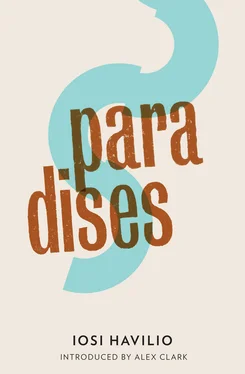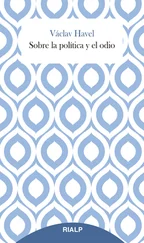Iosi Havilio - Paradises
Здесь есть возможность читать онлайн «Iosi Havilio - Paradises» весь текст электронной книги совершенно бесплатно (целиком полную версию без сокращений). В некоторых случаях можно слушать аудио, скачать через торрент в формате fb2 и присутствует краткое содержание. Год выпуска: 2013, Издательство: And Other Stories, Жанр: Современная проза, на английском языке. Описание произведения, (предисловие) а так же отзывы посетителей доступны на портале библиотеки ЛибКат.
- Название:Paradises
- Автор:
- Издательство:And Other Stories
- Жанр:
- Год:2013
- ISBN:нет данных
- Рейтинг книги:3 / 5. Голосов: 1
-
Избранное:Добавить в избранное
- Отзывы:
-
Ваша оценка:
- 60
- 1
- 2
- 3
- 4
- 5
Paradises: краткое содержание, описание и аннотация
Предлагаем к чтению аннотацию, описание, краткое содержание или предисловие (зависит от того, что написал сам автор книги «Paradises»). Если вы не нашли необходимую информацию о книге — напишите в комментариях, мы постараемся отыскать её.
is an almost perfect novel." — Albert Camus's
reimagined with a female lead in in twenty-first-century Buenos Aires.
Recently widowed, a young woman leaves the countryside for Buenos Aires with her four-year-old son where she seeks to build a new life for herself. She finds work in the zoo and moves into the human zoo of a squatted tower block at the invitation of one of its residents, to whom she acts as nurse, giving morphine injections.
Paradises — читать онлайн бесплатно полную книгу (весь текст) целиком
Ниже представлен текст книги, разбитый по страницам. Система сохранения места последней прочитанной страницы, позволяет с удобством читать онлайн бесплатно книгу «Paradises», без необходимости каждый раз заново искать на чём Вы остановились. Поставьте закладку, и сможете в любой момент перейти на страницу, на которой закончили чтение.
Интервал:
Закладка:
The sight of us unleashes Héctor’s tears. Lots of tiny tears. He embraces me, I’d like to cry too but I can’t. I’m sad, inside myself as well as by contagion, but more than that, I’m stunned. For the few seconds the embrace lasts I can smell a strong odour of mothballs. Images of Jaime and Héctor run through my head, not as I knew them, already old, but at the start of everything, when they were really brothers, five and seven years old, chasing each other, playing, fighting, the countryside always there in the background, snapshots of a childhood I imagine to have been happy.
Héctor dries his face with his cuff, recomposing himself quickly. He tells me that the wake will be on the second floor, that he’s just come from the police station, that no witnesses have come forward as yet, other than the cardboard-collecting family who found him, and that the room will be ready in fifteen minutes. He provides this information without making eye contact. Héctor’s wife, Marta, also takes part in this little conclave, and another man I’ve never seen before, white haired and smooth cheeked, who doesn’t stop nodding. The man asks how it was, what happened, and Héctor goes over the little he knows out loud, as he will continue to do for the rest of the evening. He says that the man who ran him over didn’t stop to help, that it’s hard to believe he didn’t see him, that he must have felt the impact, although perhaps he thought he had hit an animal. Marta sighs, silently indignant. He’ll go on to tell how a lawyer approached him in the police station. An arsehole, Héctor calls him, who accompanied him to the scene of the accident to take photos before they took the pickup away. What we know for sure, he concludes, is that Jaime didn’t put out the markers when he changed the tyre and that he was parked very close to the road.
The wait seems long, we’re squeezed in under the landing. As people arrive, they look at me from a distance, measuring me up, observing Simón; they must know the story, they will have heard of us, of Jaime’s new life. They’ll know that in some way I was his wife for the last four years, that the child in my arms is our son. They don’t approach, just in case. I think about Boca, the ranch hand and companion who spent so much time with Jaime. I say to myself that someone should have told him, I’m about to ask Héctor but I hold my tongue, he’s already got enough on his plate.
A boy with a piggy nose announces that the room is ready. We climb the stairs in a slow procession. The layout and wallpaper make it feel like an old house. First, a room with mirrors positioned opposite each other, to multiply the number of people, to make you feel less alone. Before it was converted into what it is now, this must have been the living and dining room. A bit further along, on either side of a wide corridor, are the bathroom and kitchen. At the back, a closed door and the room where the coffin lies.
I let Héctor and the twins approach Jaime before me. The truth is I don’t really know how to behave. I suppose I’m something like a widow and yet I’m not. When Héctor withdrew, I asked Marta to hold Simón so that I could go up. As I stepped forward, I realised I was less frightened by the idea of seeing Jaime dead than of seeing him disfigured. Héctor had given me no indication of the state in which the body had been found and I hadn’t asked. I slowed down for the last few steps, so that I would see Jaime’s body appear gradually and so lessen the shock. Not as pale as I would have expected, hands interlaced over his chest with a rosary between his fingers, jaw held up by a white handkerchief knotted round the neck, Jaime seemed, as they say, to be at peace. And for me, seeing him, no longer imagining him, had a calming effect.
I touch his forehead with the back of my hand, as if checking for fever, then his chest, and I rest my clenched fists on the cold handles of the coffin. After the initial shock, I take a step back, running my eyes over the objects decorating the room — the wreath of flowers, a standing crucifix, more flowers, in vases, bunches, some loose, two chairs made of dark wood — and I go back to observing Jaime, more carefully this time. Then I notice something perturbing.
In this new Jaime, the final Jaime, who I’ll only see this once, in addition to his stillness, the smell of alcohol, or formaldehyde, I’m not sure, I suddenly discover an oddity that bears little relation to death. Instead of his lips being sealed, as was his habit, somewhere between resignation and embarrassment, I catch sight of a small opening at the right-hand corner of his mouth, a sarcastic, sly smile, as if death had caught Jaime mocking something.
I must have been standing alone by the coffin for five minutes. From what I heard in passing, Héctor had paid extra to have a slightly superior coffin to the standard model provided by the insurance. Polished and varnished, with a bronze-plated cross. Appealing to look at and to touch. Gradually, other people began to approach, relatives, friends of the family, all unknown to me. A tiny old lady with platinum hair and sagging cheeks, a younger woman of around fifty with acne pockmarks, and two very circumspect shaven-headed men. Whether deliberately or in imitation, the four of them positioned themselves on the other side of the coffin, leaving me without protection. For a while I could feel their eyes wandering from the dead man to fix on me out of poorly disguised curiosity.
Pushing my introspection to its limit, at some point I can’t bear any more and raise my head suddenly, to greet, to make myself known, and I meet those four pairs of eyes directed at me, which look away slowly but simultaneously. I thought I felt marked out before, but this is worse. To my relief, a man in suit and tie appears and causes them to forget about me. At first he is disconcerting but he soon reveals himself to be part of the ceremony. He walks around the coffin, straightens a badly folded cloth, retreats a few steps, adjusts the stand where the wreath is and finally approaches the candelabras. He removes a spoon-like tool from his pocket and collects the wax accumulating at the base of each candle so that it doesn’t spill. He does this with great care, taking pride in his work. I suppose a candle with spilled wax would give the wrong impression, somewhere between sloppiness and indifference.
I need air, so I disappear. To reach the street, I have to go via the first floor. Unlike Jaime’s, which is more intimate, the wake on this floor is brimming. So much so that, timidly at first, gradually with more confidence, the attendees will invade our territory throughout the night, using the toilet, stealing chairs, helping themselves to coffee. They also take ownership of the staircase to sit and chat.
Out on the pavement, the night is lively. I notice many passers-by crossing the road a few metres before the funeral home. People prefer to avoid death. A blonde girl with no superstitions, ice cream in hand, comes towards me pushing a pram. She comes so close that I’m convinced she’s going to speak to me, but no, she carries on unhurriedly. I sneak a glance into the pram: she’s carrying supermarket bags. The fake baby reminds me of Simón, who I left in Marta’s care. I go back inside and no one notices my distraction; they must think I went to the toilet to cry in private. Marta and Simón are in the kitchen making little boats and planes out of paper napkins. Thanks, I say, and she replies: He’s an angel.
By one o’clock, there’s hardly anyone left. Simón is sleeping on the floor like a puppy, between a couple of women wearing too much make-up. Marta approaches Héctor, who is sitting three chairs from me. The boys are hungry, she says. Héctor springs up: Let’s go. And to me: Will you come for something to eat? First, he breaks away towards Jaime, takes a look at him and returns. I follow suit, without wanting to; I feel I’ve already said goodbye, but it’s the done thing. He’s the same as before, slightly less alive, with that stony smile that will stay with me for ever. At the very last second, there’s time for a fleeting memory of that rough man I fell in love with unintentionally and with whom I fell out of love without realising it. I can still feel him jerking about on top of me, like an animal, impotent at times, insatiable at others. A memory that belongs to me and me only, I think as I turn my back and move away.
Читать дальшеИнтервал:
Закладка:
Похожие книги на «Paradises»
Представляем Вашему вниманию похожие книги на «Paradises» списком для выбора. Мы отобрали схожую по названию и смыслу литературу в надежде предоставить читателям больше вариантов отыскать новые, интересные, ещё непрочитанные произведения.
Обсуждение, отзывы о книге «Paradises» и просто собственные мнения читателей. Оставьте ваши комментарии, напишите, что Вы думаете о произведении, его смысле или главных героях. Укажите что конкретно понравилось, а что нет, и почему Вы так считаете.











